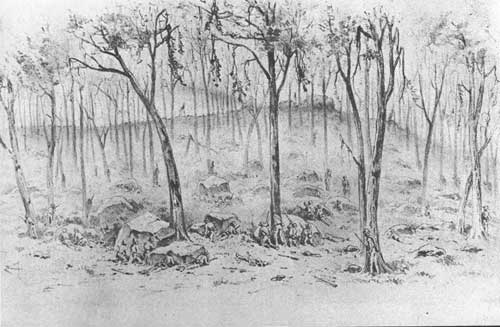|
|
| |
Civil War SeriesThe Battle of Gettysburg |
|
|
|
 |
|
JULY 3, MORNING—CULP'S HILL
Five Union batteries opened a deadly fire on the Confederate
penetration on Culp's Hill at dawn. A Maryland Confederate wrote that
"the whole hillside seemed enveloped in a blaze." The artillery fire
ceased in half an hour, and the Confederates renewed their assault. The
fighting continued until late morning. Johnson's men attacked three
times, and each attack failed. The Twelfth Corps units had been
reinforced by troops from the First and Sixth Corps, and their position
was too strong four the Confederates to take.
Most of the Union troops fought from the cover of breastworks; the
Confederates had only the shelter afforded by trees and rocks on the
hill's slopes. The principal fighting rook place on the main hill.
There, Union regiments moved to and from the
breastworks from a nearby ravine where the soldiers cleaned their
rifles and replenished their ammunition. In the last Confederate
attacks, at perhaps 10 A.M., the Stonewall Brigade and Daniel's North
Carolina brigade assaulted Greene's position from the east while
Steuart's brigade advanced over Pardee Field toward the main hill. Both
attacks failed dismally. A futile attack by two Union regiments across
the meadow by Spangler's Spring against Johnson's left symbolized the
end of the fighting on the hill, and by noon it was over. Ewell's
assaults against the Union right had failed.

|
EDWIN FORBES ILLUSTRATION OF THE CONFEDERATE ATTACK ON CULP'S HILL (GNMP
COLLECTION)
|
There was a signal act of bravery at the end of Johnson's last
assault. Some soldiers of the Stonewall Brigade were stranded near
the Union breastworks when the brigade's assault failed and were certain
to be shot if they did not surrender. Maj. Benjamin W. Leigh of General
Johnson's staff saw them attempt to surrender and rode almost to the
Union works in an effort to stop them. Union soldiers shot at Leigh, of
course, and riddled him and his horse with bullets. But they admired his
bravery, mentioned it in their reports, and buried him with special
care.
|
|
|
